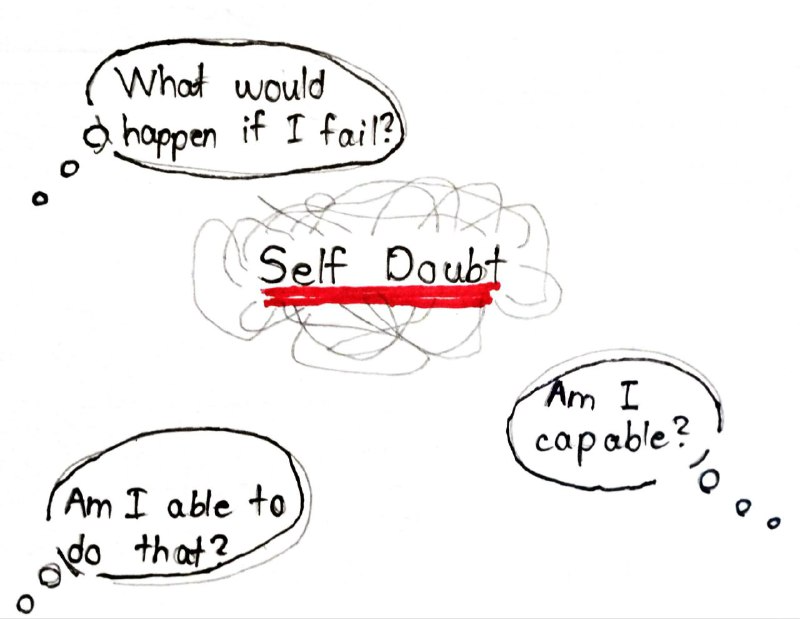



Self doubt during UPSC preparation

The UPSC (Union Public Service Commission) examinations are a tough and competitive test that demands unwavering dedication and resilience from aspirants. The journey to success in these exams can be overwhelming, leading to stress, self-doubt, and immense pressure. However, incorporating mindfulness into their preparation routine can serve as a transformative tool for UPSC aspirants, empowering them to build resilience, embrace challenges, and ultimately succeed.
Preparing for the civil services exam is a long and arduous journey. Many candidates confront feelings of inadequacy and self-doubt while preparing for the exam. Maintaining one's self-confidence during preparation is a challenge nearly every candidate faces and must overcome.
Reasons why UPSC aspirants face issues of self-confidence are:
Long duration of preparation - the exam cycle itself is a year long. Moreover, it typically takes candidates several years of dedicated preparation before they succeed.
Overwhelming competition - Given that there are a thousand or so seats for which more than 10 lakh candidates apply, the chances of selection of a candidate are statistically low. Frequently, many candidates also feel that those they are competing against have better academic backgrounds or resources.
Uncertainty of outcome - Despite years of sincere preparation, there is no guarantee of success in a competitive examination like this one.
High opportunity costs - Aspirants spend several years of their prime preparing for this exam, keeping other career options aside. Much give up well paying corporate jobs.
Vast syllabus - The exam covers a very wide range of topics. No one is comfortable with everything. In fact, most candidates find some or the other syllabus topics difficult to understand or recall.
Failures along the way - The civil services exam is multi-stage. For most candidates, there is a high chance that they will encounter failures at some stage or the other.
Emotional attachment- Since aspirants put their heart and soul into UPSC preparation; they become emotionally attached to it; which makes them insecure.
Impact of Self-Doubt
Undermining Confidence
One of the primary ways self-doubt affects individuals is by undermining their confidence. When we doubt our abilities, decisions, or worth, it creates a pervasive sense of insecurity. Lack of confidence can prevent individuals from realising their full potential.
Fear of Failure
Self-doubt often manifests as a paralysing fear of failure. The constant questioning of one's capabilities can lead to hesitation and reluctance to take risks. Individuals grappling with self-doubt may find themselves trapped in their comfort zones, avoiding challenges that could ruin the preparation journey.
Impaired Decision-Making
Self-doubt can hinder effective decision-making. Individuals having self-doubt may second-guess their choices, leading to a fear of making the wrong move. This can result in missed next opportunities and a reluctance to embrace new experiences that could contribute to further development in this UPSC journey.
Procrastination and Avoidance
Self-doubt often goes hand in hand with procrastination and avoidance. The fear of not measuring up or making mistakes can lead aspirants to put off tasks or avoid challenges. This behaviour, while providing temporary relief, ultimately restrains progress.
Addressing their exam anxieties, fears of failure and bouts of self doubt.
Understand your anxiety - Confront your demons instead of brushing them under the carpet. Identify the reasons why this exam makes you nervous and why you question your own capabilities.
Accept that it is normal - Appreciate the fact that almost all civil services candidates face such issues. Do not berate yourself for feeling this way.
Maintain a support system – some aspirants also felt insecure that whether quitting their job after some unsuccessful attempt. A healthy circle of friends and family must help to tide over the negativity.
Set short-term goals and achieve them - Do not wait year long for the UPSC to declare whether you have succeeded or not. Give yourself shorter-term goals and work towards achieving them. Cracking the exam then becomes a series of small steps instead of a distant goal.
Believe in your self - Know yourself, identify your strengths and also accept your limitations. Recall your past successes, however small. Some aspirants, who became IAS in his eighth/nineth attempt, were sustained by a strong belief in their own capabilities.
Rewire your brain - Neuroscientist contends that just like mastering any other talent, developing self- confidence requires repetition and time. You should be your loudest cheerleader.
Be well prepared Nothing beats exam- related stress than being well prepared. Ensure comprehensive syllabus coverage, multiple revisions and ample writing practice so that you feel closer to your goal.
Know that there are other options - The UPSC exam, though important, is not the end of the world, it takes a while for UPSC aspirants to realize that failure in this exam doesn't mean that you won't succeed in life.
Finally, it is important to remember that UPSC CSE is just an exam like any other exam. Do not make it your whole life. Talk to your near and dear ones. This journey will give you a lot of life lessons. So, be ready to learn those lessons with a smile on your face. This is how heroes are made. Self-confidence and self-motivation play a key role in your performance in the different stages of the exam. Similarly, control over nervousness helps you in the optimum expression of your true knowledge. So acknowledge your feelings and observe the triggers and prioritise your mental health.
© 2026 iasgyan. All right reserved